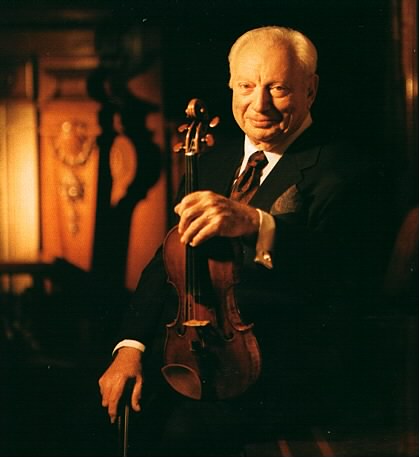

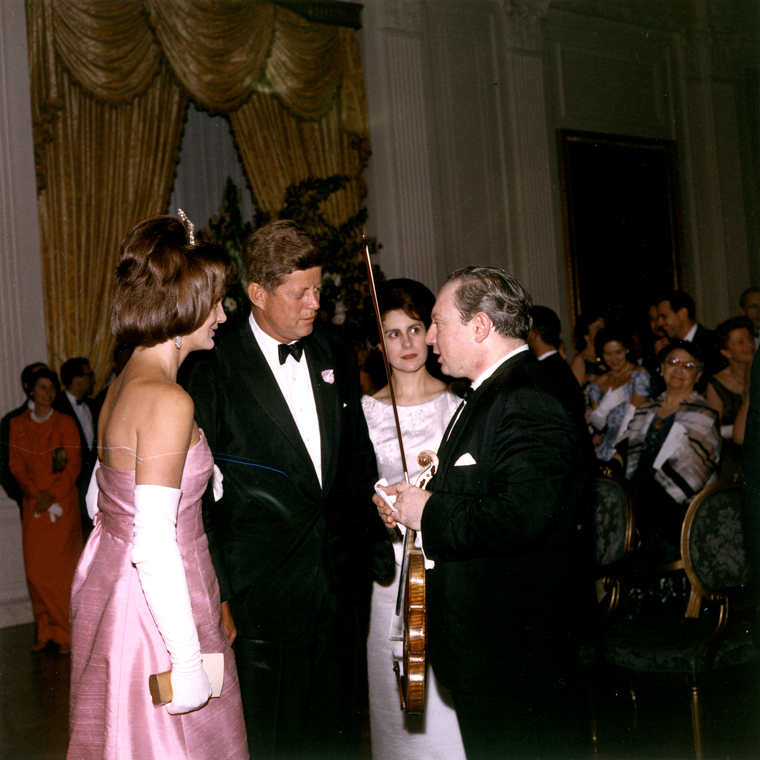
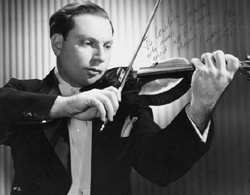 IS: Oh, I should say so! I’m part of a long
line of musicians — people who have made music, who
have meant something in their own time and been pathfinders to some degree.
I’ve been a part of the whole of the musical fabric of my lifetime.
I’ve know most of the major musicians intimately for the past half century.
Here in Chicago, I first played fifty-one years ago with Frederick Stock.
That’s a long time! There is not a single Music Director of the Chicago
Symphony with whom I have not appeared more than once. Not a single
one! I have appeared with every single one since Frederick Stock, and
I have been here with guest conductors, too. So I’ve heard this orchestra
in all its years, its changing years, its glorious years, its difficult years.
And to come now and hear this orchestra, to this day having a special kind
of esprit de corps is very rare amongst
orchestras. There is perhaps one other orchestra in this country
— Cleveland — which has something like this.
And there are two or three others in the world that have this kind of pride
in themselves. It is something to come and play and to make music.
To play a work like the Beethoven Concerto
four times, and the four different performances are different from the performances
I played two months ago, and different from the performances I played a year
ago, and different from the performances I did when I recorded it with Daniel
Barenboim some years ago in Paris. This is the evolution of music.
IS: Oh, I should say so! I’m part of a long
line of musicians — people who have made music, who
have meant something in their own time and been pathfinders to some degree.
I’ve been a part of the whole of the musical fabric of my lifetime.
I’ve know most of the major musicians intimately for the past half century.
Here in Chicago, I first played fifty-one years ago with Frederick Stock.
That’s a long time! There is not a single Music Director of the Chicago
Symphony with whom I have not appeared more than once. Not a single
one! I have appeared with every single one since Frederick Stock, and
I have been here with guest conductors, too. So I’ve heard this orchestra
in all its years, its changing years, its glorious years, its difficult years.
And to come now and hear this orchestra, to this day having a special kind
of esprit de corps is very rare amongst
orchestras. There is perhaps one other orchestra in this country
— Cleveland — which has something like this.
And there are two or three others in the world that have this kind of pride
in themselves. It is something to come and play and to make music.
To play a work like the Beethoven Concerto
four times, and the four different performances are different from the performances
I played two months ago, and different from the performances I played a year
ago, and different from the performances I did when I recorded it with Daniel
Barenboim some years ago in Paris. This is the evolution of music.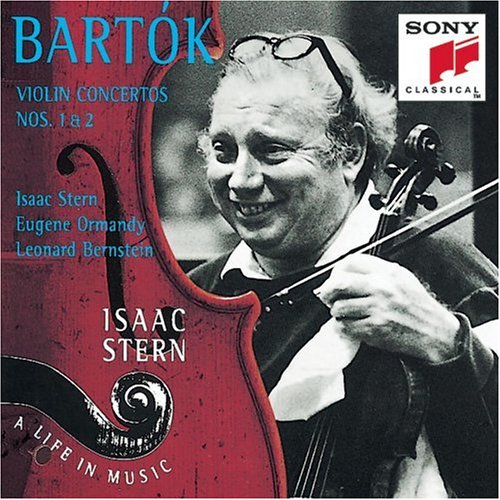 IS: To a degree. There are some that stand
out in memory. I very rarely listen to my own recordings, very rarely!
As a matter of fact, I don’t even have a whole set of my own recordings.
A few years ago, my three children said, “Hey Dad, you know, we don’t have
all your recordings.” I’ve been with one company, CBS, for over fifty
years. I have been longer with a company than any artist in the history
of recording. Nobody has remained with one label as I have! So
I asked the recording company to get things out and get me a complete set.
I got four or five complete sets of everything I had done. We gave
them to the kids and we had a couple of complete sets at home. I don’t
think I have a quarter of them left, because they keep being given away by
my wife as gifts. So I don’t even have a complete set of my own recordings
at home! Sometimes I have to check with the company, “Please send me
a couple of this, and a couple of that.” And, oh, those are out of
print, so I have to get them out of the icebox. Fortunately, because
I’ve recorded for so long, they are now doing reissues of all the recordings,
starting with my first ones from 1946, retrospectives, all being put out
and remastered on CD’s.
IS: To a degree. There are some that stand
out in memory. I very rarely listen to my own recordings, very rarely!
As a matter of fact, I don’t even have a whole set of my own recordings.
A few years ago, my three children said, “Hey Dad, you know, we don’t have
all your recordings.” I’ve been with one company, CBS, for over fifty
years. I have been longer with a company than any artist in the history
of recording. Nobody has remained with one label as I have! So
I asked the recording company to get things out and get me a complete set.
I got four or five complete sets of everything I had done. We gave
them to the kids and we had a couple of complete sets at home. I don’t
think I have a quarter of them left, because they keep being given away by
my wife as gifts. So I don’t even have a complete set of my own recordings
at home! Sometimes I have to check with the company, “Please send me
a couple of this, and a couple of that.” And, oh, those are out of
print, so I have to get them out of the icebox. Fortunately, because
I’ve recorded for so long, they are now doing reissues of all the recordings,
starting with my first ones from 1946, retrospectives, all being put out
and remastered on CD’s.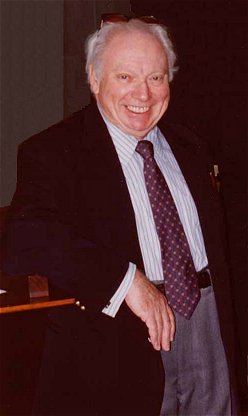 BD: What advice do you have for someone who wants
to write music for the violin?
BD: What advice do you have for someone who wants
to write music for the violin?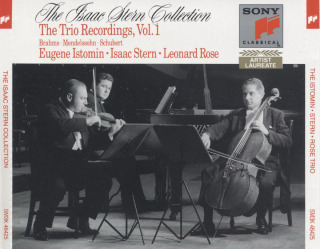 IS: Well, hopefully he’ll have a good one.
We try to get the best pianos available, and we kick and scream when the
pianos are not good enough. There are at least a dozen cities in the
United States that have new pianos after I’ve threatened to use the pianos
that they had for firewood at the next outdoor cooking!
IS: Well, hopefully he’ll have a good one.
We try to get the best pianos available, and we kick and scream when the
pianos are not good enough. There are at least a dozen cities in the
United States that have new pianos after I’ve threatened to use the pianos
that they had for firewood at the next outdoor cooking!|
Isaac stern was born in Kremenetz, Ukraine,
on July 21, 1920. His family travelled to the United States when he was one
year old and settled in San Francisco. He was trained in music by his mother,
a professional singer and, at age 7, first began learning the piano, then
the violin at age 9. He later studied for 3 years with Robert Pollack and
for a few months with Louis Persinger. He also studied until age 15 with
Nahum Blinder, whom he considered his only true teacher. He was later to
say, "He taught me how to learn by myself, which is the most important thing
a teacher can teach you." From this time on, Isaac Stern became very interested
in chamber music, already playing quartets and quintets with the principals
of the San Francisco Orchestra. At age 15, he performed J. S. Bach's Double Concerto on stage with his teacher.
The following year, in 1936, he played the Brahms Concerto with the San Francisco Symphony
Orchestra under Pierre Monteux, then the Tchaikovsky Concerto in Los Angeles under Otto Klemperer.
On October 11, 1937, he made his New York debut at Carnegie Hall, a concert-hall
where he again appeared in February 1939. This new public appearance was
hailed by enthusiastic critics, placing him at the forefront of musicians
of his generation. During World War II, he gave many concerts for the Armed
Forces.
In January 1943, Isaac stern gave his first
Carnegie Hall recital. The following year, he appeared twice with the New
York Philharmonic Orchestra conducted by Dimitri Mitropoulos. In 1945, he
made his first recordings for Columbia, and the following year, he was chosen
by Hollywood to double the violin parts for the actor John Garfield in the
film Humoresque. This launched his
career, and thereafter he went on to play with the greatest conductors :
Sir Thomas Beecham, Dimitri Mitropoulos, Bruno Walter, Eugene Ormandy, Leonard
Bernstein and George Szell. He played the part of Eugène Ysaÿe
in the film Tonight We Sing, relating
the life of the great impresario Sol Hurok. In 1948, he made his European
debut at the Lucerne Festival. In 1950, he took part in the first Prades Festival,
organized with Pablo Casals by Alexander Schneider to celebrate the 200th
anniversary of J. S. Bach's death. He again appeared with Casals during the
following years in Perpignan and Prades, and a few years later at the Puerto
Rico Festival.
His meeting with the famous cellist was a determinant influence and led him to devote part of his activity to chamber music, with Eugene Istomin, Alexander Schneider, William Primrose or Paul Tortelier. In the early 1960s, he organized a trio with Eugene Istomin and Leonard Rose, which became extremely successful and toured widely until Rose's death in 1984. In 1956, during the cold war, he was also one of the first US musicians to tour widely in the USSR. On the other hand, contrary to Yehudi Menuhin, he always refused to play in Germany, in memory of the atrocities committed under nazi rule. He had very strong ties with the State of Israel and collaborated assiduously with Israelo-American cultural centers and foundations, providing advice and support to young musicians in that country. He thus played an important role as a pedagogue and mentor for young Israeli virtuosi including Itzhak Perlman, Pinchas Zukerman, Myriam Fried, Sergiu Luca and Shlomo Mintz.
A perfect balance between virtuosity and musicianship In addition to his activity as a violinist, Isaac Stern participated intensively in American musical life, making important contributions as music director for the National Council for the Arts. Since 1960, he has also been Chairman of Carnegie Hall, that prestigious concert-hall which, with others, he saved from demolition. In 1979, he made a trip to China, and the film relating this event, From Mao to Mozart, was awarded an Oscar in 1981. Many contemporary works were composed for Isaac stern, including William Schuman's Concerto in 1950, Leonard Bernstein's Serenade in 1954, George Rochberg's Concerto in 1975, Penderecki's Concerto n°1 in 1977, Dutilleux's Concerto in 1985 and Maxwell Davies' Concerto in 1986. In 1987, Isaac stern formed a new trio with Yo-Yo Ma and Emanuel Ax, which performs and records in company of such artists as Jaime Laredo and Cho-Liang Lin. Due to his fiery temperament, unique generosity of tone and fascinating musicianship, Isaac stern has achieved the ideal balance between the virtuoso and the musician. A symbol of American violin playing for over 50 years, he is also one of the greatest 20th century masters.
Violins: Guarneri del Gesù (1737) "The Vicomte de Panette" which Isaac stern bought in 1947 and sold in 1994. In 1996, Vadim Repin recorded the Ravel and Medtner sonatas on this instrument, which was lent to him be his present owner, Mr. David Fulton. Guarneri del Gesù (1740), which belonged to Eugène Ysaÿe and includes a label signed by the Belgian violinist and stating: "This violin was the faithful companion of my career." Later owned by Charles Munch, this violin was purchased by Isaac stern in 1965. It was also played by Yehudi Menuhin and Ivry Gitlis. Stradivari (1721) "The Kruse", which belonged to Rodolphe Kreutzer Carlo Bergonzi which now belongs to Paavo Berglund. G. B. Guadagnini (1750). G. B. Guadagnini (1754), which now belongs to Boris Belkin. J. B.Vuillaume (1846) "The Tsar"
Bows: F. X. Tourte, Persois, N. Kittel, E. Pageot, D. Peccatte, Voirin, Henry, Sartory which belonged to Ysaÿe.
|
This interview was recorded in Chicago on May 27, 1991. Portions
were used (along with recordings) on WNIB in 1995 and 2000. This transcription
was made and posted on this website in 2009.
To see a full list (with links) of interviews which have been transcribed and posted on this website, click here.
Award - winning broadcaster Bruce Duffie was with WNIB, Classical 97 in Chicago from 1975 until its final moment as a classical station in February of 2001. His interviews have also appeared in various magazines and journals since 1980, and he now continues his broadcast series on WNUR-FM, as well as on Contemporary Classical Internet Radio.
You are invited to visit his website for more information about his work, including selected transcripts of other interviews, plus a full list of his guests. He would also like to call your attention to the photos and information about his grandfather, who was a pioneer in the automotive field more than a century ago. You may also send him E-Mail with comments, questions and suggestions.